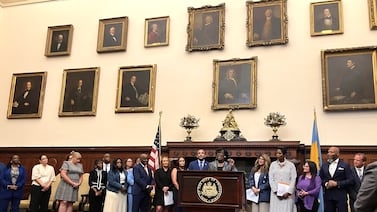Sign up for Chalkbeat Chicago’s free daily newsletter to keep up with the latest news on Chicago Public Schools.
Chicago’s school board voted Thursday to spend up to $25 million to revive a troubled program that aims to reengage some of the city’s toughest-to-reach dropouts.
The new contract enlists the social services agency Metropolitan Family Services to oversee a revamped Back to Our Future program. So far, the city of Chicago has kicked in $1.5 million and the state another $4 million to fund the initiative, and district officials said they hope philanthropists will also chip in.
Last summer, the district wound down Back to Our Future, launched during the pandemic to help 1,000 students ages 14 to 21 who had disconnected from school. The district teamed up with three nonprofits to provide 12 weeks of high school credit recovery, job skills, mental health support, mentoring, and a stipend to participants, among other services.
A Chalkbeat Chicago investigation last fall found that recruitment stumbles, a lack of a clear education plan, and frustration at the state with a dearth of outcomes data ultimately led to the decision to pause the program, which lost its funding from the Illinois Department of Human Services last spring. Ultimately, the program cost roughly $8 million. It steered about 150 students back to school and helped 60 graduate, most of them from alternative high schools.
The board unanimously approved the contract with Metropolitan Family Services Thursday without discussion. During a meeting earlier this month, some had praised Back to Our Future as a worthwhile and innovative initiative to help young people whom school districts have traditionally written off. Others wondered whether the district would work more closely with alternative high schools, which were brought in late in the game last time around after CPS found few students were successfully completing an online credit recovery program at partner nonprofits.
At that earlier meeting, CPS officials said the original program showed small results, which were nevertheless significant given its focus on extremely vulnerable students.
“While this was really ambitious, and we set out to do something really great for the school district and the city of Chicago at large, this was a very hard to reach population,” Toni Copeland, director of student supports and violence prevention programs at the district’s Office of Safety and Security. “That was something we anticipated, but maybe not in the way we should have.”
Copeland said the program drew the attention of Mayor Brandon Johnson’s Office of Community Safety, which included a revamp of the program into his $100 million People’s Plan for Community Safety, rolled out last year.
The consensus was that the program needed an agency to oversee spending, train the partner nonprofits, monitor results, and ensure that both CPS and the nonprofits are pulling their weight, Copeland said. The district got three bids from organizations interested in serving in that role. Metropolitan Family Services has no experience working with disconnected youth, but was picked based on its experience working with nonprofits that serve vulnerable adults, officials said.
Metropolitan Family Services provides a wide range of programs in the city and suburbs, including after-school programs, job training, legal assistance, and counseling. Its president and CEO, Ricardo Estrada, who has led the nonprofit since 2011, is married to Beatriz Ponce de León, Chicago’s deputy mayor for immigrant, migrant, and refugee rights.
Back to Our Future was the brainchild of former CPS chief of safety and security Jadine Chou, who left the district earlier this month for a job in the private sector.
Earlier this month, school board members peppered CPS officials with questions about the program, asking for a written plan for its implementation, inquiring why the district needs a middleman like Metropolitan Family Services, and wondering if there is a better plan to engage alternative high schools.
“The vast majority of students who were able to graduate from the program were graduating from options schools, and so it seems like they ought to be engaged from the beginning,” board member Jessica Biggs told officials, using the CPS name for high schools serving students who had dropped out or are at risk of dropping out.
Mila Koumpilova is Chalkbeat Chicago’s senior reporter covering Chicago Public Schools. Contact Mila at mkoumpilova@chalkbeat.org.







